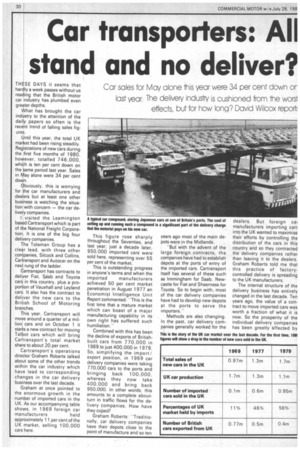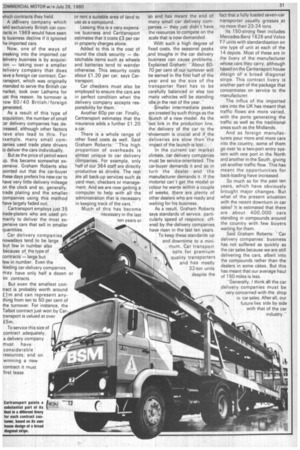Car transporters: All stand and no deliver?
Page 32

Page 33

If you've noticed an error in this article please click here to report it so we can fix it.
Car sales for May alone this year were 34 per cent down or
last year. The delivery indus-ry is cushioned from the worst effects, but for how long? David Wilcox repot
THESE DAYS it seems that hardly a week passes without us reading that the British motor car industry has plumbed even greater depths.
What has brought the car industry to the attention of the daily papers so often is the recent trend of falling sales figures.
Until this year, the total UK market had been rising steadily. Registrations of new cars during the first five months of 1980, however, totalled 746,000, which is ten per cent down on the same period last year. Sales in May alone were 34 per cent down.
Obviously, this is worrying for the car manufacturers and dealers but at least one other business is watching the situation with concern — the car delivery companies.
I visited the Leamington based Cartransport which is part of the National Freight Corporation. It is one of the big four delivery companies.
The Toleman Group has a clear lead, with three other companies, Silcock and Collins, Cartransport and Autocar on the next rung of the ladder.
Cartransport has contracts to deliver Fiat, Saab and Toyota cars in this country, plus a proportion of Vauxhall and Leyland cars. It also has the contract to deliver the new cars to the British School of Motoring branches.
This year, Cartransport will move around a quarter of a million, cars and on October 1 it starts a new contract for moving Talbot cars which will bring Cartransport's total market share to about 20 per cent.
Cartransport's operations director Graham Roberts talked about some of the other trends within the car industry which have lead to corresponding changes in the car delivery business over the last decade.
Graham at once pointed to the enormous growth in the number of imported cars in the UK. As our accompanying table shows, in 1969 foreign car manufacturers held approximately 11 per cent of the UK market, selling 100,000 cars here. This figure rose sharply throughout the Seventies, and last year, just a decade later, 950,000 imported cars were sold here, representing over 55 per cent of the market.
This is outstanding progress in anyone's terms and when the imported manufacturers achieved 50 per cent market penetration in August 1977 an Economist Intelligence Unit Report commented: "This is the first time that a mature market which can boast of a major manufacturing capability in its own right has suffered such humiliation.'" Combined with this has been the decline of exports of Britishbuilt cars from 770,000 in 1969 to just 400,000 in 1979. So, simplifying the import! export position, in 1969 car delivery companies were taking 770,000 cars to the ports and bringing back 100,000, whereas they now take 400,000 and bring back 950,000. In other words, this amounts to a complete aboutturn in traffic flows for the delivery companies. How have they coped?
Graham Roberts: "Traditionally, car delivery companies have their depots close to the point of manufacture and so ten years ago most of the main depots were in the Midlands.
"But with the advent of the large foreign contracts, the companies have had to establish depots at the ports of entry of the imported cars. Cartransport itself has several of these such as Immingham for Saab. Newcastle for Fiat and Sheerness for Toyota. So to begin with, most of the car delivery companies have had to develop new depots at the ports to serve the importers.
Methods are also changing. In the past, car delivery companies generally worked for the dealers. But foreign cal manufacturers importing care into the UK wanted to maximise their efforts by controlling the distribution of the cars in this country and so they contracted the delivery companies rather than leaving it to the dealers. Graham Roberts told me that this practice of factorycontrolled delivery is spreading to the UK manufacturers.
The internal structure of the delivery business has entirely changed in the last decade. Ten years ago, the value of a contract to move imported cars was worth a fraction of what it is now. So the prosperity of the individual delivery companies has been greatly 'affected by vhich contracts they held.
A alivery company which ield exclusively British car con racts in 1969 would have seen ts business decline if it ignored he imported cars.
Now, one of the ways of areaking into the imported car
ielivery business is by acquisiion — taking over a smaller lelivery company that does lave a foreign car contract. Ca rransport, which was originally ntended to serve the British car -narket, took over Lathams for ust this reason, Its turnover is tow 60 / 40 British/foreign lenerated.
As a result of this type of acquisition, the number of small :ar delivery companies has de.;reased, although other factors lave also lead to this. For axample, many small companies used trade plate drivers to deliver the cars individually.
But as the price of petrol went Jp, this became somewhat expensive. Graham Roberts also pointed out that the car-buyer these days prefers his new car to have very little delivery mileage Dn the clock and so, generally, trade plating and the smaller companies using this method have largely faded out.
Cartransport employs just 35 trade-platers who are used primarily to deliver the most expensive cars that sell in smaller quantities.
Car delivery companies nowadays tend to be large but few in number also because of the type of contracts — large but few in number. Even the leading car-delivery companies may have only half a dozen or so contracts.
But even the smallest contract is probably worth around m and can represent anything from ten to 50 per cent of the turnover. For instance, the Talbot contract just won by Cartransport is valued at over £5m.
To service this size of contract adequately, a delivery company must have considerable resources; and on winning a new contract it must first lease or rent a suitable area of land to use as a compound.
Leasing this is a very expensive business and Cartransport estimates that it costs E3 per car in property charges alone.
Added to this is the cost of round the clock security — detatchable items such as wheels and batteries tend to wander otherwise. This security costs about £1.20 per car, says Cartransport.
Car checkers must also be employed to ensure the cars are in perfect condition when the delivery company accepts responsibility for them, Another 60p per car. Finally, Cartransport estimates that the insurance adds a further £1.20 a car.
There is a whole range of
other fixed costs as well. Said Graham Roberts: -This high proportion of overheads is almost unique to car delivery companies. For example, only half of our 364 staff are directly
productive as drivers. The rest are all back-up services such as yard men, checkers or management. And we are now getting a computer to help with all the administration that is necessary in keeping track of the cars."' Much of this has become necessary in the last ten years or so and has meant the end of many small car delivery companies — they just didn't have the resources to compete on the scale that is now demanded.
With such a high degree of fixed costs, the seasonal peaks and troughs in the car delivery business can cause problems. Explained Graham: -About 6070 per cent of our turnover will be earned in the first half of the year and so the size of the transporter fleet has to be carefully balanced or else too many vehicles will be standing idle in the rest of the year.
Smaller intermediate peaks are created by such things as the launch of a new model. As the last link in the production line, the delivery of the car to the showroom is crucial and if the deliveries are slow then the impact of the launch is lost.
In the current car market climate, car delivery companies must be service-orientated. The car-buyer demands it and so in turn the dealer and the manufacturer demands it. If the motorist can't get the model or colour he wants within a couple of weeks, there are plenty of other dealers who are ready and waiting for his business.
As a result, Graham Roberts says standards of service, particularly speed of responce, offered by the delivery companies have risen in the last ten years.
To keep these standards up and downtime to a minimum, Car transport opts for premium quality transporters \ and has mostly 32-ton units despite the
fact that a fully loaded seven-car transporter usually grosses .at no more than 23-24 tons.
Its 150-strong fleet includes Mercedes-Benz 1626 and Volvo F7 units with standardisation on one type of unit at each of the 14 depots. Most of these are in the livery of the manufacturer whose cars they carry, although based on the Cartransport house design of a broad diagonal stripe. This contract livery is another part of the package that concentrates on service to the manufacturer.
The influx of the imported cars into the UK has meant that traffic flows are more varied, with the ports generating the traffic as well as the traditional areas such as the Midlands.
And as foreign manufac turers pour more and more cars into the country, some of them go over to a two-port entry system with one port in the North and another in the South, giving yet another traffic flow. This has meant the opportunities for back-loading have increased.
So much so for the past ten years, which have obviously brought major changes. But what of the present situation with the recent downturn in car sales? It is estimated that there are about 400,000 cars standing in compounds around the country with few buyers waiting for them.
Said Graham Roberts: "Car delivery companies" business has not suffered as quickly as the car sales because we are still delivering the cars, albeit into the compounds rather than the dealers in some cases_ But this has meant that our average haul of 150 miles is less.
"Generally, I think all the car .delivery companies must be .very concerned with the drop
in car sales. After all, our future lies side by side with that of the car industry.




















































































































